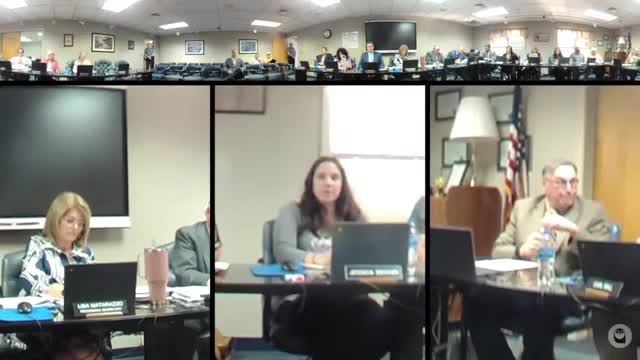Delaware Valley board debates withdrawing from OCR agreement, proposed ‘two sexes’ resolution
Get AI-powered insights, summaries, and transcripts
Subscribe
Summary
Board members, legal counsel and residents debated whether to seek release from an Office for Civil Rights agreement and whether the board should adopt a resolution asserting there are two sexes; the board agreed to continue its legally advised, phased approach and to discuss the matter again in May.
The Delaware Valley School District Board of Directors spent much of public comment and board discussion on concerns about an Office for Civil Rights (OCR) agreement, recent presidential executive orders and a proposed board resolution asserting that “there are only two sexes.”
The debate mattered because board members and outside speakers said the issues could affect district policy and federal funding. Some board members said they had already asked OCR and the White House for guidance and were waiting for federal direction due April 29; others urged a faster, more direct withdrawal from OCR and immediate policy changes to protect girls’ privacy in bathrooms and locker rooms.
Board member Jack Fisher pressed the board to move quickly to end the district’s participation in the OCR agreement and to adopt a resolution stating there are two sexes. Fisher said he wanted the board to prioritize what he described as girls’ safety and to act without delay.
Other board members and the district’s legal advisers counseled caution. Multiple attorneys who advised the board at a recent legal briefing told members that withdrawing from the OCR and changing policies could expose the district to legal challenges and potential funding disputes, and advised a measured, legally informed process. A board member said the district had written to the White House and OCR seeking release and that the board planned to wait up to 90 days for an official federal response before taking further formal action.
Residents and audience members addressed the board at length. Matthew Contreras criticized the board’s handling of recent meetings as disorderly and questioned the curriculum committee’s work. Resident John McCain urged the board to continue inviting Special Olympics participants to speak to the board and to publicly recognize student accomplishments.
Board members also discussed legal references cited during the meeting, including Title IX, the Doe v. Boyertown court decision, and recent federal guidance and executive orders. Several board members said the legal landscape was evolving: one noted executive orders and federal guidance issued in January and a follow-up plan expected by April 29, and another cited ongoing litigation in other states as evidence that the issue is unsettled.
No formal board vote was taken to withdraw from OCR or to adopt the “two sexes” resolution during the meeting. The board majority supported following the solicitor’s recommended, phased approach: pursue release requests already submitted to OCR and the White House, monitor federal guidance due April 29, and reconvene for a public discussion at the May work session before considering formal policy changes or votes.
The board and its solicitor repeatedly said legal options exist if federal funding were withheld, including seeking injunctions or court review, but cautioned that each path carries risks and costs that the board must weigh.
The board scheduled further public discussion of the matter in May; board members said they wanted clearer federal and state guidance before adopting policies or resolutions that could trigger litigation or jeopardize funding.
